- Home
- Steven Becker
Wood's Revenge Page 10
Wood's Revenge Read online
Page 10
“Turn it off quick,” he yelled to Jeff. They were underneath the new span of the Seven Mile Bridge, only a few hundred feet from Pigeon Key. “I got gas all over. She fires at us again, we’re gonna blow.”
The engine surged again, and Trufante knew it was for the last time. They needed to get off the boat. Behind them, the jet ski seemed to sense their predicament and accelerated, quickly closing the gap. “Get ready to bail!” Trufante yelled. His long frame was coiled up like a cat, ready to fly over the gunwales. It’d been a long time since he’d run, but back in the day, he used to be fast, and he wondered if he could make the two-mile sprint across the old bridge to Marathon. If he could get off the bridge, he would be able to blend in somewhere.
He heard a woman scream and looked ahead at the crowd gathered around the concrete walled perimeter of the old saltwater pool. Fifty feet from land, the engine finally died and he wasted no time. Springing from the gunwale, he was in the water in seconds, stroking for the concrete seawall, separating the old pool from the ocean. Originally built in the fifties as a tourist attraction, the pool had fallen into disrepair and had been used as a small harbor for years. Recently, money had been raised by the Pigeon Key Foundation, and the pool had been repaired.
Without looking back, he stroked for the concrete wall, deciding that Jeff was on his own. A small group of tourists stood on a newly built dock, staring into the water. He heard the roar of the jet ski, but there was nothing he could do except claw at the water in an attempt to get away. The tourists scattered as he reached the wall and tried to haul himself over. He grabbed the new wood and pulled, using his feet to propel himself from the water. A girl shrieked and he smiled, trying to reassure her, but she ran to her parents with a frightened look on her face.
Behind him he heard the jet ski and looked back. Straddling the concrete seawall with one foot in the ocean and the other in the pool, he saw them. The tourists were gone now, and he could see why. The jet ski was out of control, in the air and flying toward him like a missile. The looks of terror on the faces of Hector and the woman froze in his mind. Jeff was trying to get out of the water, but it was too late. Once the watercraft was out of the water there was no way to control it. The only way to stop was naturally as the inertia died, or by hitting something, and Jeff was directly in its path.
Diving into the pool, Trufante took one last look and saw the nose of the jet ski hit Jeff in the back. His weight did nothing to slow the craft. In slow motion, it careened over the pool, and, with Jeff’s body cushioning the blow, was stopped by the base of a tree. Treading water, he looked for a way to escape unnoticed when something brushed against his leg. Again, he had to leave Jeff to his own devices.
The rough skin tore at his thigh and he looked down at the six-foot bonnethead shark swimming between his legs. Without a thought about Jeff, Hector or the woman, he pulled himself from the pool and collapsed on the dock. Sharks were worse than guns, in his opinion, and he released his breath after the life-threatening experience, only to look up and see the barrel of a pistol pointed at his head.
“Look, the big man’s afraid of the silly shark,” he heard a young girl yell from across the pool. Her father pulled her quickly out of sight before he could rebut the comment. There was no such thing as a silly shark.
“Idiot,” the woman yelled. “Go, find us a way off this island. And not in a boat,” she ordered Hector and turned to Trufante. “You and your friend have caused enough trouble. Let’s go.” She motioned the barrel toward a steep curving ramp that led to the old section of the Seven Mile Bridge.
He started up the old exit ramp and reached the bridge, looking back at Jeff. Surrounded by a group of people, he couldn’t tell if he was dead or alive, but expected the latter. Drunks bounce—they don’t break. Facing ahead now he saw the stream of tourists walking to and from Marathon to the key. Trufante looked around for any way out. The water, fifty feet below, might look clear and inviting, but he knew the currents running through the bridge piers could kill him as easily as the gun pointed at his back. At least he had avoided the shark. The honk of a horn brought him back to reality, and he looked back to see Hector driving a golf cart toward them.
“How’s this?” he asked.
The woman gave him a shut-up look and pushed Trufante into the back seat. She slid in next to him and Hector pressed the gas pedal. The cart gained speed, slowly covering the two-mile stretch of old pavement.
Mac had the trawler running at twelve knots. With its bow easily cutting through the small windblown waves, Sprigger Bank would be a two-hour trip. Once they were through Vaca Cut and in open water, he set the autopilot and sat back in the captain’s chair. Mel and Jen were below, working on the dead man’s phone, and Pamela sat across from him, mindlessly watching the water ahead, with a deep frown etched in her face. He thought about trying to talk to her, but after the past few hours of her company, he doubted he’d get a coherent answer. With both stone crab and lobster season closed, the run was easier without having to watch for the trap buoys, though he would have to pay attention for several shoals.
He let his mind drift to try and solve the mystery of the fish and the dead man while he watched the water. Back in the day, he and Wood had prospected the waters around Sprigger Bank. The fishing was good, but the lobster and crab were only mediocre, owing to the unbroken plains of seagrass in the area. The bank was a long run and because it lay just outside of the Everglades National Park boundary there were often Fish and Game officers in the area—not a good mix for commercial fishermen.
There were often research boats there as well, and he remembered what had been eluding him. He pulled out his cell phone. There were still three bars of service, and he scrolled through his contacts. Alicia’s name came up and he started pecking into the small keyboard, something he was only fair at on land, but in the choppy waters he quickly became frustrated and hit the phone icon.
She answered and they chatted for a minute, but he quickly got to the point before the reception faded.
“Can you pull up anything you can find on Springer Bank?” he asked.
“Sure, what are you looking for?”
“Might be NOAA or maybe another of the alphabet agencies—something scientific,” he said.
Mel must have heard him and came to his side with a questioning look on her face. He mouthed Alicia and put her on speakerphone. “National Science Agency,” Mel said, handing him a slip of paper with coordinates written on it.
“Try this. Latitude 24.91 293492; Longitude 80.93 798347,” he recited.
“Got it. Give me a minute,” Alicia said. A few minutes later she was back on the line. He set the phone on the armrest so Mel and Jen could hear. “It’s an FCE LTER site.”
“A what?” Mel asked.
“Florida Coastal Everglades Long Term Ecological Research. TS/Ph11.”
“PH what?” Mel asked.
Jen interrupted. “I read about this. It’s the last water-testing station for the Taylor Slough drainage.”
They looked blankly at her.
“There are two natural runoffs from the Everglades: Shark River, which is larger and exits the mainland around Ten Thousand Islands below Fort Myers, and Taylor Slough, which runs toward the east and empties into Florida Bay.”
“So the contaminated fish has something to do with runoff from the Everglades,” Mel said.
“It would appear so. If we can get the data from the station, we might be able to figure out what happened,” Jen said.
“I can tell you what happened,” Mac started. “The storm and tides brought agricultural chemicals all the way down here. They’ve been fighting this battle around Fort Myers and Port St. Lucie on the East Coast for years. That’s where they have been pumping the floodwaters. Now, there is pressure to restore the natural flow, and here’s the result.”
“Give me a few minutes and I can get the data,” Alicia interrupted.
“Thanks,” Mel said and hung up.
�
��I still want to see the site. Data or not, there’s nothing like hands-on, and I’m betting that station has something to do with the dead man,” Mac said, turning the autopilot off and taking control of the boat. He checked the GPS and corrected course to avoid a small shoal directly in their path.
Mel and Jen went below. A minute later, Mel returned with the open laptop in her hands. “Look at this. I bet if we follow the trail of testing stations, we can find the source.”
Mac had to shield his eyes from the setting sun to see the screen. Icons littered the display, but he was quickly able to sort them out and follow the trail of Taylor Slough stations. Number eleven, the one at Sprigger Bank, was the last in the string. Two more followed the coastline of the Keys, then they became more concentrated on the mainland. The path of test stations skirted the edge of the Everglades running adjacent to Homestead.
“So, just connect the dots and find the bad guys,” Mac said.
“You’re not thinking about doing this yourself?” Mel asked.
“You trust anyone else out there?”
She paused for a minute. “There’s a few advocacy groups trying to stop Big Sugar and restore the Everglades. I can make some calls.”
“And while you’re doing that, I’ll just take a cruise and see where this leads.” He looked up and peered into the glare of the sun on the water. “That’s the marker right up there,” he said, pointing at a crooked pole in the distance.
“What do you expect to find?” Mel asked.
“Never know until you get there. I’ve seen a few of these sites over the years. Just a big grid on the bottom,” he said, slowing to an idle and steering wide around the marker. Around them the sea was a darker brown, indicating shallow water.
“Any idea where the site is?” Mac asked Jen.
“Never been out here, but the GPS points extended to six places are usually dead-on.”
Mac looked at the chart plotter. The waypoint was in the middle of the bank, too shallow for the four-foot draft of the trawler to attempt. “I’m going to anchor and have a look.” He coasted up to the mudflat in front of the boat and dropped the anchor, then backed down to set it. Once he was sure it was buried in the mud, he watched the waves and the drift of the boat to make sure they wouldn’t be pushed onto the flats. Satisfied, he went below and came back a few minutes later with a mask and fins.
“I’ll just be a few,” he said. Sitting on the dive platform off the transom, he spit in the mask, rinsed it with seawater and put it over his head. The fins were longer than normal, used for free diving, and he put them to the side, deciding against them. There was nothing to be gained by the added propulsion. The larger fins would only stir up the silt, and the bottom could easily damage the carbon tips. And in four feet of water, he could walk.
With the mask in place, he nodded to Mel and Jen and slid into the water.
Recalling their position in relation to the icon on the chart plotter, he swam toward the area. The GPS was accurate to thirty feet, but he could only see about ten feet around him. Slowly he scanned the bottom while he swam toward the invisible mark. The seagrass was still in the slack current, and he could see small mangrove snapper darting around him. Ahead, the bottom dipped to eight feet and he saw something man-made. He grabbed a quick breath and submerged to check it out. The white tape pinned to the seafloor clearly marked the border of the test area. He surfaced directly above it and took another breath. Something had not looked right.
He breathed up, enriching his lungs with oxygen, and descended. Running his hands along the bottom, he could see the area had been disturbed. It had the familiar look of bottom that had been dredged.
15
Jane sat back as Hector pegged the accelerator, honking the horn at anyone in their way. The golf cart reached maximum speed, which was just faster than she could run. Reaching the end of the two-mile section of bridge, he steered around the bollards set to keep larger vehicles out. Heading for the parking lot just ahead, he jumped a curb and accelerated onto the road.
“How far’s the bait place?” she yelled at Hector.
“It’s about a mile on the right. We can cross up there.” He pointed at an intersection ahead.
She gritted her teeth, willing the golf cart to go faster as he pulled onto US 1. Traffic stacked up behind them, and she sensed the drivers’ impatience at the slow speed of the cart. Finally they reached the intersection and he turned off the main highway. Cutting through a neighborhood, she looked at the line of mobile homes and canals, not failing to notice that the boats behind them were worth more than the houses.
Hector turned into an unmarked alley, and she found herself in the gravel lot of Monster Bait.
“Take him to your brother. He was bragging how he made him talk once. Let him have another shot at it,” she said.
Hector laughed and headed toward the small shack where Trufante had lost the tip of his finger. They pulled up in front of the shack and she looked back at Trufante.
“There’s no need for that. I’ll tell you what you want,” Trufante groveled.
Hector left and returned with Edgar. Both brothers were sporting big grins.
“Nothing like a little pain to get the truth,” she said, nudging him forward with the barrel of her gun. She knew the information would probably be easy to get without the torture, but she was looking forward to seeing how he had lost part of his finger.
“Really. This about the fish? Got them out by Sprigger Bank. Anything you want to know, you just ask,” Trufante said.
He hesitated outside the door, but she pushed him through. Edgar had already fired up the machine and stood in front of them with his bloodstained rubber apron and gloves. Trufante took a step back, but again she pushed him forward.
“Come on. Mac must have found the boat the net snagged. I don’t know anything else.”
“He found a boat?” Jane asked, signaling to Edgar to turn off the machine.
“That boat we had was out at Wood’s place. Got her running and all, just one engine, though.”
She signaled Edgar to start the grinder again and grabbed Trufante’s hand. “What else do you know?” His fingers were within a few inches disappearing into the dark cavity, and she could see the razor-sharp tips of the spinning teeth used to pulverize fish into chum. He must have seen them too and started to fight, causing her to lose her grip.
“Come on. I’ll take you out there if you want. Whatever, just turn that thing off.”
She pulled her hand across her neck in a slicing motion, amused that the Cajun thought that she was calling for his death, then saw his relief when Edgar frowned and shut down the engine. “Get a fast boat,” she ordered Hector. “Take your brother and make sure there is nothing going on out there.”
“There was nothing left after we finished,” Hector whined.
She glared at him and turned to Trufante. “Come on, lover boy, you’re coming with me.”
“What do we do if there’s someone out there?” Hector asked.
“Tell them I have their friend.”
A large check had placated Manuel and now, glad to be back in the Audi, she breathed deeply, then wrinkled her nose as Trufante’s smell invaded her space. “Go find a hose and do something about your hygiene,” she said. “And I’m watching you.” She lowered the windows and got out of the car, watching the tall Cajun as he went behind one of the sheds. A minute later, she could see a stream of water flowing on the ground. In her trunk was a towel, which she handed to him, sacrificing it, mostly to save the leather seats.
He dried off and looked at her. “What do you need me for?”
“Because I like your company,” she smirked and ordered him into the car with the barrel of the gun. She waited until he was settled, then went to the driver’s side and slid into the seat. With the gun under her thigh, she pressed the child safety button and placed the shifter in drive. Once past the potholed driveway, she turned right onto the road, then made another right onto US 1. Traffic
was light and she shifted quickly, pulling around a semi and taking the left lane.
“Hot damn. This baby goes. What’cha got for horses under that hood?” Trufante asked, showing his grin.
“Just glad it’s not a boat,” she said, turning her attention back to the road. After passing numerous versions of the same strip center, filled with the typical tourist wares: T-shirts, sandals, shells, and restaurants with thatched roofs, she wondered why this was called paradise. Maybe Key West had something not present here, but you had to suffer over a hundred miles of crap to get there.
She closed the windows, hoping the stench of the overripe male next to her had dissipated, and turned on the air conditioner. Glancing over at Trufante, still smiling and enjoying the ride, she picked up her cell phone and hit several buttons. The call started on the car’s speakers, but she quickly changed it to her phone. This was not going to be pleasant. The mess she had come down here to clean up was worse.
Dusharde answered immediately and asked her status in his businesslike manner. Murder and kidnapping were on par with signing a contract to him—and her. In that regard, they worked easily together. “I have some issues,” she started.
Mac swam back to the trawler in the dark. The sun had set and the brief twilight had ended while he was checking the site. He climbed aboard and brushed aside the inquiring looks of Mel and Jen until he had the gear stowed.
“What’s it supposed to look like down there?” he asked Jen.

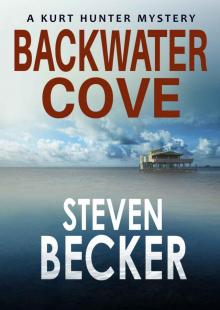 Backwater Cove
Backwater Cove Storm Surge: A Fast Paced International Adventure Thriller (Storm Thriller Series Book 3)
Storm Surge: A Fast Paced International Adventure Thriller (Storm Thriller Series Book 3)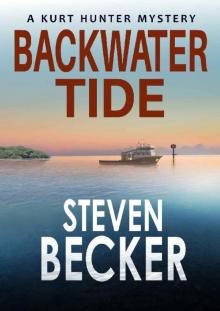 Backwater Tide
Backwater Tide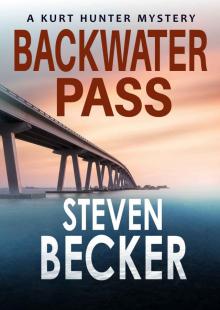 Backwater Pass
Backwater Pass Backwater Flats
Backwater Flats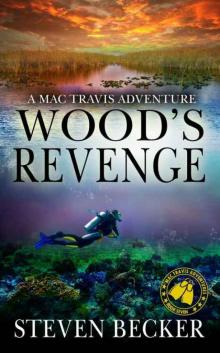 Wood's Revenge
Wood's Revenge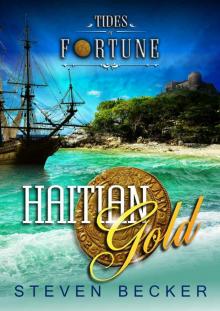 Haitian Gold
Haitian Gold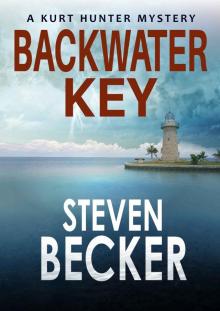 Backwater Key
Backwater Key Wood's Tempest
Wood's Tempest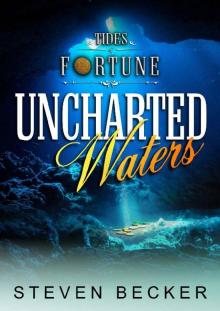 Uncharted Waters
Uncharted Waters Tuna Tango
Tuna Tango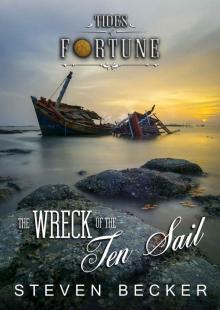 The Wreck of the Ten Sail
The Wreck of the Ten Sail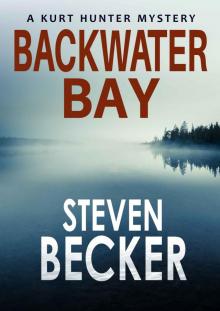 Backwater Bay (Kurt Hunter Mysteries Book 1)
Backwater Bay (Kurt Hunter Mysteries Book 1) Storm Clouds
Storm Clouds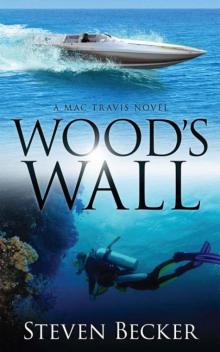 Wood's Wall
Wood's Wall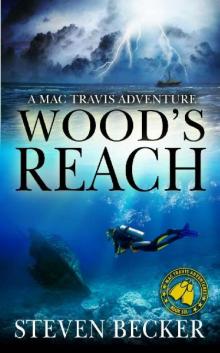 Wood's Reach
Wood's Reach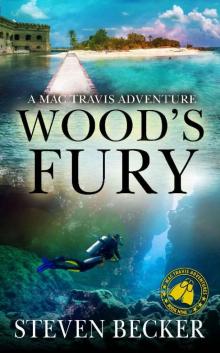 Wood's Fury
Wood's Fury Storm Rising
Storm Rising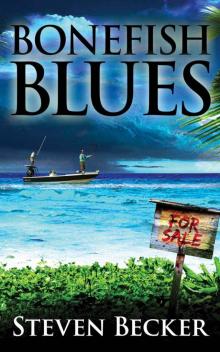 Bonefish Blues
Bonefish Blues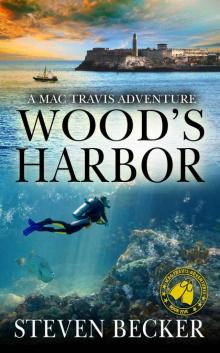 Wood's Harbor: Action & Sea Adventure in the Florida Keys (Mac Travis Adventures Book 5)
Wood's Harbor: Action & Sea Adventure in the Florida Keys (Mac Travis Adventures Book 5)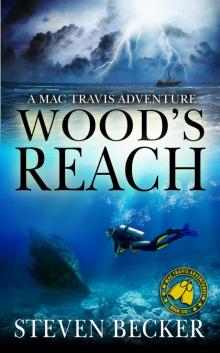 Wood's Reach: Action & Sea Adventure in the Florida Keys (Mac Travis Adventures Book 6)
Wood's Reach: Action & Sea Adventure in the Florida Keys (Mac Travis Adventures Book 6)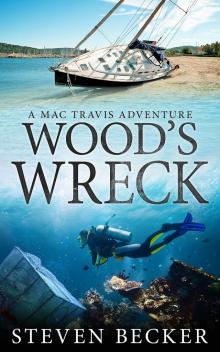 Wood's Wreck
Wood's Wreck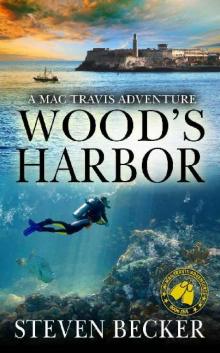 Wood's Harbor
Wood's Harbor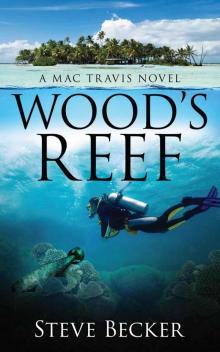 Wood's Reef
Wood's Reef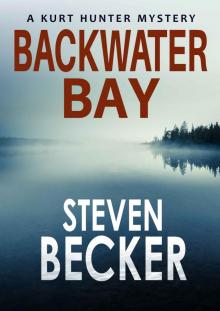 Backwater Bay
Backwater Bay